Hyundai Bayon VS Suzuki S-Cross
Hyundai Bayon
The Hyundai Bayon is a compact crossover that effortlessly merges practicality with modern design. Its sleek exterior and spacious interior make it an ideal choice for urban settings and longer journeys alike. With a focus on comfort and connectivity, this vehicle provides a smooth driving experience paired with advanced technology features.
more informationSuzuki S-Cross
The Suzuki S-Cross emerges as a versatile crossover, blending urban agility with a rugged presence suited for diverse terrains. Its design combines sleek, modern aesthetics with practicality, offering a spacious interior that comfortably accommodates passengers and cargo for varied journeys. Drivers will appreciate the advanced technology features that enhance both driving pleasure and safety, making the S-Cross a well-rounded option for those seeking reliability and style in a compact SUV.
more information @ hyundai.news
@ hyundai.news
 @ hyundai.news
@ hyundai.news
 @ hyundai.news
@ hyundai.news
 @ hyundai.news
@ hyundai.news
 @ hyundai.news
@ hyundai.news
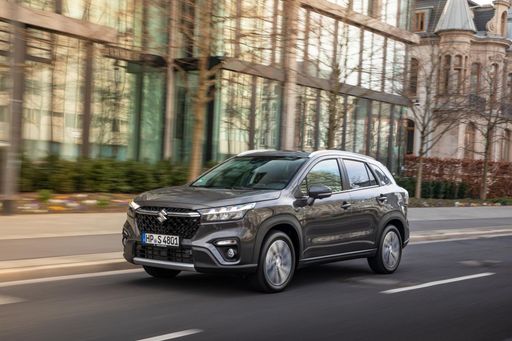 @ Suzuki
@ Suzuki
 @ Suzuki
@ Suzuki
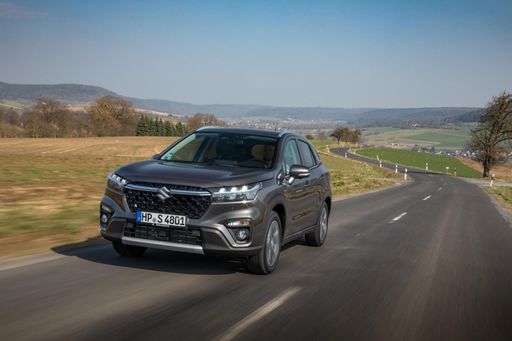 @ Suzuki
@ Suzuki
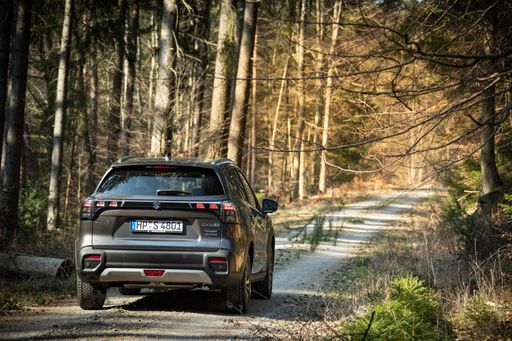 @ Suzuki
@ Suzuki
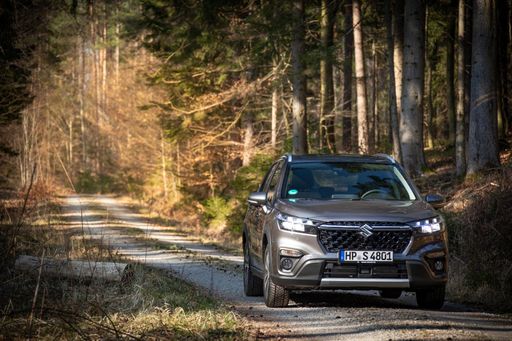 @ Suzuki
@ Suzuki
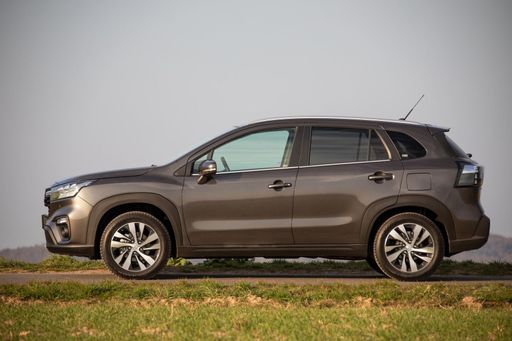 @ Suzuki
@ Suzuki
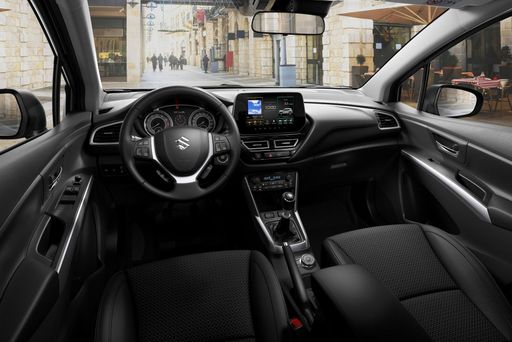 @ Suzuki
@ Suzuki
Costs and Consumption |
|
|---|---|
|
Price
about 21200 - 27400
$
|
Price
about 29100 - 36400
$
|
|
Consumption L/100km
5.4
L
|
Consumption L/100km
5.1 - 5.8
L
|
|
Consumption kWh/100km
-
|
Consumption kWh/100km
-
|
|
Electric Range
-
|
Electric Range
-
|
|
Battery Capacity
-
|
Battery Capacity
-
|
|
co2
122
g/km
|
co2
116 - 131
g/km
|
|
Fuel tank capacity
40
L
|
Fuel tank capacity
47
L
|
Dimensions and Body |
|
|
Body Type
SUV
|
Body Type
SUV
|
|
Seats
5
|
Seats
5
|
|
Doors
5
|
Doors
5
|
|
Curb weight
1170 - 1195
kg
|
Curb weight
1280 - 1435
kg
|
|
Trunk capacity
411
L
|
Trunk capacity
430
L
|
|
Length
4180
mm
|
Length
4300
mm
|
|
Width
1775
mm
|
Width
1785
mm
|
|
Height
1500
mm
|
Height
1580
mm
|
|
Payload
460 - 465
kg
|
Payload
375 - 405
kg
|
Engine and Performance |
|
|
Engine Type
Petrol
|
Engine Type
Full Hybrid, Petrol MHEV
|
|
Transmission
Manuel, Automatic
|
Transmission
Automatic, Manuel
|
|
Transmission Detail
Manual Gearbox, Automat. Schaltgetriebe (Doppelkupplung)
|
Transmission Detail
Automated Manual, Manual Gearbox
|
|
Drive Type
Front-Wheel Drive
|
Drive Type
Front-Wheel Drive, All-Wheel Drive
|
|
Power HP
100
HP
|
Power HP
116 - 129
HP
|
|
Acceleration 0-100km/h
11.3 - 12.4
s
|
Acceleration 0-100km/h
9.5
s
|
|
Max Speed
176 - 179
km/h
|
Max Speed
175 - 195
km/h
|
|
Torque
172 - 200
Nm
|
Torque
235
Nm
|
|
Number of Cylinders
3
|
Number of Cylinders
4
|
|
Power kW
74
kW
|
Power kW
85 - 95
kW
|
|
Engine capacity
998
cm3
|
Engine capacity
1373 - 1462
cm3
|
|
Top speed
176 - 179
km/h
|
Top speed
175 - 195
km/h
|
General |
|
|
Model Year
2024
|
Model Year
2024
|
|
CO2 Efficiency Class
D
|
CO2 Efficiency Class
D
|
|
Brand
Hyundai
|
Brand
Suzuki
|
Hyundai Bayon
Introducing the Hyundai Bayon: A New Era in Compact SUVs
The Hyundai Bayon, a compact SUV designed with urban adventurers in mind, is making waves with its exceptional blend of style, performance, and technology. The brand has pulled out all the stops to ensure that the Bayon stands out in the crowded SUV market, offering a vehicle that is both practical and innovative.
Sleek Design and Cutting-Edge Aerodynamics
The Bayon features a striking exterior design, characterised by its bold lines and angular shapes. With a length of 4180 mm, a width of 1775 mm, and a height of 1500 mm, the Bayon commands attention with its modern appeal and aerodynamic efficiency. These dimensions not only contribute to its sleek design but also enhance fuel efficiency, achieving an impressive 5.4 L/100 km.
Engine Performance and Specifications
Under the bonnet, the Bayon is powered by a 1.0-litre T-GDI petrol engine, delivering a robust 100 PS or 74 kW. This engine is available with either a manual or automatic gearbox, meeting varied driver preferences. The front-wheel-drive system complements its urban-centric design, ensuring a smooth and responsive ride.
Maximised Interior Space and Comfort
The spacious interior of the Bayon accommodates up to five passengers comfortably. The vehicle boasts a boot space of 411 litres, perfect for both everyday use and weekend getaways. The cabin is designed with practicality and technology in mind, with intuitive controls and ample storage options.
Advanced Technology and Connectivity
Hyundai has equipped the Bayon with state-of-the-art technology to enhance the driving experience. The SUV features a high-resolution touchscreen, offering seamless connectivity with Apple CarPlay and Android Auto. Safety is also a priority, with multiple driver assistance systems including lane-keeping assist and forward collision avoidance assist.
Environmental Efficiency
Despite its powerful performance, the Bayon achieves a respectable CO2 efficiency class of D, with emissions as low as 122 g/km. This balance between performance and environmental responsibility makes the Bayon an attractive option for conscientious drivers.
Affordability and Market Appeal
The Hyundai Bayon is competitively priced, ranging from €22,900 to €29,600. Its affordable running costs, estimated at 32.3 to 36.4 cents per kilometre, further enhance its appeal to budget-conscious consumers. With monthly costs ranging from €806 to €909, the Bayon provides excellent value without compromising on features or performance.
Final Thoughts
The Hyundai Bayon truly stands out in the compact SUV segment, combining style, innovation, and practicality in an appealing package. It offers a versatile driving experience suited to the demands of modern urban living, making it a top contender in its class. As Hyundai continues to champion forward-thinking design and technology, the Bayon is a testament to the company's ongoing commitment to excellence.
Suzuki S-Cross
Introducing the Versatile Suzuki S-Cross
The Suzuki S-Cross stands out as a remarkable offering in the competitive SUV market, combining practicality with modern technology. This car is designed to cater to a diverse range of drivers, offering innovative hybrid technology alongside a comfortable and spacious interior.
Efficient Performance: The Heart of the S-Cross
At the core of the Suzuki S-Cross are its hybrid engine options. Customers can choose between a mild-hybrid or a full-hybrid engine, which both provide impressive fuel efficiency and driveability. The mild-hybrid 1.4 Boosterjet comes with a manual transmission, while the 1.5 Dualjet full-hybrid offers an automatic option. This flexibility ensures that there's an S-Cross model for everyone.
Technical Brilliance and Engineering
The Suzuki S-Cross excels with a range of technical specifications. Offering between 116 to 129 PS, the vehicle also boasts a CO2 efficiency class of D, maintaining an eco-friendly performance with CO2 emissions ranging from 118 to 132 g/km. With a top speed of up to 195 km/h and a nimble 0-100 km/h acceleration of just 9.5 seconds, the S-Cross demonstrates dynamic capability without compromising on environmental consciousness.
Innovative Design and Spacious Comfort
The exterior dimensions, with a length of 4300 mm, a width of 1785 mm, and a height of 1580 mm, provide a substantial presence while offering a spacious interior. The boot space of 430 litres, combined with a seating capacity for five, ensures that the S-Cross is as practical as it is comfortable.
Driving Experience and Versatility
The S-Cross provides a choice between front-wheel drive and the all-terrain ALLGRIP all-wheel-drive system, allowing for flexibility depending on the driver's needs. The suspension and handling have been finely tuned to deliver a smooth driving experience across various conditions, further underscoring the vehicle's versatility.
Cost Efficiency and Ownership
When it comes to cost, the Suzuki S-Cross offers competitive pricing, with monthly costs ranging from €909 to €1045 and an economical cost per kilometre of 36.4 to 41.8 cents. This makes it an attractive option for those seeking cost-effective motoring without sacrificing performance or style.
Conclusion
The Suzuki S-Cross remains an impressive contender in the SUV segment, offering a blend of efficient hybrid engines, practical design, and state-of-the-art technology. Whether you're navigating city streets or exploring off the beaten path, the S-Cross provides a reliable and stylish driving solution.
